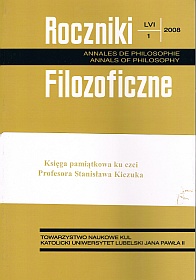The Alternative Versions of Evolution and the Problem of God’s Omnipotence
Abstract
The author discusses the question whether an alternative version of cosmological and bio-logical evolution could have been actualized to eliminate negative phenomena specific for evolutionary processes in our universe. Specifically, one tries to answer whether the omnipotent God could have created quite different world with different logical principles and diverse laws of nature. Maybe such a world would be better than our universe regarded by Leibniz as the best of all possible universes.
In trying to solve this problem, one has to remember that the process of evolution co-directs the created world to Divine ideals, values, and purposes; it does not, however, destroy by a logic of necessity or by a determinism of events, which would limit the freedom of creation. It does not eliminate pain and it does not change suffering into joy; it only shows the deepest meaning of the struggles thanks to which biological pain manifests its creative role.
References
Barrow J. D., Tipler F. J.: The Anthropic Cosmological Principle, Oxford: Clarendon Press 1986.
Batens D. et al. (eds.), Frontiers of Paraconsistent Logic, Baldock: Research Studies Press 2000.
Brown B.: On Paraconsistency, [w:] D. Jacquette (ed.), A Companion to Philosophical Logic, Oxford: Blackwell 2006, s. 628-650.
Davies P.: Teleology without Teleology: Purpose through Emergent Complexity, [w:] In Whom we live and move and have our being, Grand Rapids, Mi: Eerdmans 2004, s. 97-102.
De Grasse Tyson N., Goldsmith D.: Wielki początek, Warszawa: Prószyński i S-ka 2006.
Facchini F.: L’emergenza dell’uomo nell’evoluzione, [w:] L’Evoluzione: Crocevia di scienza, filosofia e teologia, Roma: Studium 2005.
Feynman R.: „Rev. Mod. Phys.” 20 (1948), s. 267.
Heller M.: Wstęp, [w:] Ewolucja i stworzenie, Kraków: OBI 2005.
Kłósak K.: Teoria duchowości duszy ludzkiej w ujęciu św. Tomasza z Akwinu – Próba jej dalszego rozwinięcia, „Analecta Cracoviensia” 1 (1969), s. 32-56.
Maślanka K.: Liczba i kwant, Kraków: OBI 2004.
McMullin E.: Biology and the Theology of the Human, [w:] P. R. Sloan (ed.), Controlling Our Destinies, University of Notre Dame, Ind 2000.
Moss L.: Darwinism, Dualism, and Biological Agency, [w:] V. Hösle, C. Illies (eds.), Darwinism & Philosophy, University of Notre Dame Press 2005, s. 349-364.
Peacocke A.: Relating Genetics to Theology on the Scientific Map of Knowledge, [w:] P. R. Sloan (ed.), Controlling Our Destinies, University of Notre Dame, Ind 2000.
Peitgen H. O., Jürgens H., Saupe D.: Granice chaosu. Fraktale, cz. 1, wyd. 2, Warszawa 1997.
Peters T.: God – The World’s Future: Systematic Theology for a Postmodern Era, Minneapolis: Fortress Press 1992.
Rahner K.: Theological Investigation, t. 6, Baltimore: Helicon 1969.
Słomka M.: Ewolucjonizm chrześcijański o pochodzeniu człowieka, Lublin: Gaudium 2004.
Stewart I.: Czy Bóg gra w kości? Nowa matematyka chaosu, Warszawa: Wydawnictwo Naukowe PWN 2001.
Weinberg S.: „Physics Today” 32 (1979), no. 12, s. 18.
Życiński J.: Bóg i ewolucja, Podstawowe pytania ewolucjonizmu chrześcijańskiego, Lublin: TN KUL 2002.
Życiński J.: Antropogeneza ewolucyjna w ujęciu Kazimierz Kłósaka i w nauczaniu Jana Pawła II, [w:] A. Latawiec (red.), Myśl filozoficzna Ks. Prof. Kazimierza Kłósaka, Warszawa: Wyd. UKSW 2004.
Życiński J.: God and Evolution. Fundamental Questions of Christian Evolutionism, Washington, D.C.: Catholic University of America Press 2006.
Copyright (c) 2008 Roczniki Filozoficzne

This work is licensed under a Creative Commons Attribution-NonCommercial-NoDerivatives 4.0 International License.





